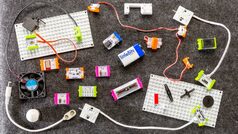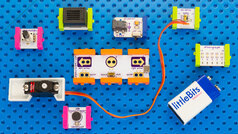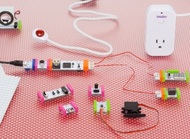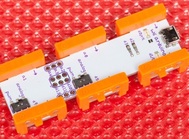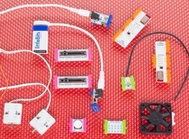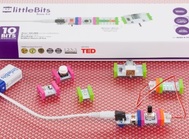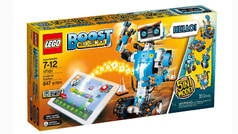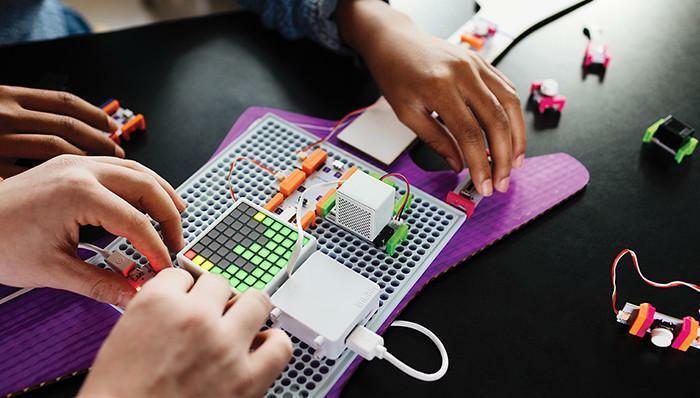
[ad_1]
We’re fans of LittleBits modular electronics kits; we’ve awarded them several Editors’ Choice awards, most recently to the second edition Gizmos & Gadgets Kit. The company’s latest offering is the Code Kit. It’s designed to be used in education settings to introduce kids from 3rd to 8th grades to programming principles, by creating games through coding. LittleBits encourages parents to urge their schools to buy the kit. But if you really want to get your kids involved in coding and are willing to take an active role in the process, you can purchase the kit for yourself—and we evaluated it on the basis of potential home use. It’s a robust solution and an effective tool. At $299.95 (for one to three kids), though, it isn’t the cheapest way to go.
What Do You Get?
For those unfamiliar, LittleBits is an electronics kit system built around small devices called Bits that connect magnetically. Each Bit represents a function—an input button or a light sensor, say, rather than an individual component such as a diode or resistor. They’re color-coded to indicate their purpose: input, output, logic, or power.
Components that are new to the Code Kit are the CodeBit—basically a small computer with inputs and outputs—and the LED Matrix Bit for displaying images, scrolling text, and animations. The Code Kit also comes with an updated Speaker Bit, a mounting board to secure all the Bits you’re using for a project in one place, a USB dongle for wireless connectivity, a rechargeable battery, and more. There are 16 Bits and 30 accessories altogether.
Similar Products
You also get a free computer-based app with the kit. The Code Kit app supplies the programming environment. It uses Google Blockly–based code; with Blockly, developers create their own visual block-based programming languages. So instead of typing in each line, you drag code blocks together to form command strings. Once the code’s ready, you upload it wirelessly to the Code Bit to bring your project to life.
The app also leads you to available online educational resources, including an intro project; tutorials on loops, logic, and other programming fundamentals, with supporting projects; four game-coding customizable projects (Inventions) that have the classic LittleBits DIY feel to them; and a project that challenges students to invent a game that can help kids’ communities. Also included are lesson plans, handouts you can print, and other materials teachers will appreciate.
Learning to Code
The introductory project is called “Hello, World,” in a nod to a tradition in the coding world of introducing novices to a new programming language. A video in the app shows you how to snap together a simple circuit that leads to the LED Matrix Bit. You’re then sent to the coding screen within the app. You can code the scrolling text message of your choice, and then you’re shown how to color each individual LED and create an image or animation. Creativity is encouraged from the get-go.
The four Inventions (games) are extended versions of the same process. You’re shown how to build the necessary electronics circuit, and given the code string you need, then encouraged to customize it. When you’re ready, you wirelessly upload the code to your Code Bit. Each Invention also includes a Craft Time segment, where you use analog materials—paper, magic markers, scissors—to create components you’ll need to play the games.
For example, in the Ultimate Shootout Invention, you create a soccer-like desktop game. After building its circuit, you make a net for your goal out of cardboard, markers, a hole puncher, and twist ties. LittleBits suggests ways to “level up your game” by customizing the code; you can create your own images for the LED Matrix, add sound effects, and invent new games to play with the setup.
I made another invention, the Rockstar Guitar. First I put together the necessary circuit—and it couldn’t have been simpler or quicker (unlike the very elaborate but worth-the-time Lego Boost Creative Toolbox catbot I built a few weeks earlier) and pressed the completed circuit onto the mounting board. Then I cut an electric guitar shape out of poster board, colored it with markers, and twist-tied the mounting board onto the body of my “guitar.” (Craft Time took me way longer than putting the electronic circuit together.)
Once I had my guitar body, I connected my PC to the Code Bit, cleared the leftover code, and uploaded the prewritten Rockstar Guitar code. When I pressed the Button Bit, electronic sound emerged; I could change the pitch with the Slide Bit. Then the jamming commenced.
The lesson goes on to show you how to change the notes you play by changing the code, how to swap out components to make it sound more like a real electric guitar, and even how to create an entirely new invention—a DJ turntable. In the process of learning new ways to adapt their creations, kids are learning the principles of programming.
Conclusions
Not every child will want to pursue a career as a software engineer. But many (if not most) careers in the future will require some understanding of how programming works. While meant to be used in schools, the LittleBits Code Kit can serve as a learning experience at home as well. The price includes a lot of supporting educational resources that might be overkill for some families, though. The Lego Boost Creative Toolbox ($159.99) is a less expensive alternative for those who don’t need all the school-oriented components of the Code Kit, and our Editors’ Choice.
4.0

(Opens in a new window)
(Opens in a new window)
View More
The LittleBits Code Kit is a terrific educational package meant to be used in schools; families can buy it too, but it may be overkill for some.
[ad_2]
Source link : https://www.pcmag.com/reviews/littlebits-code-kit

